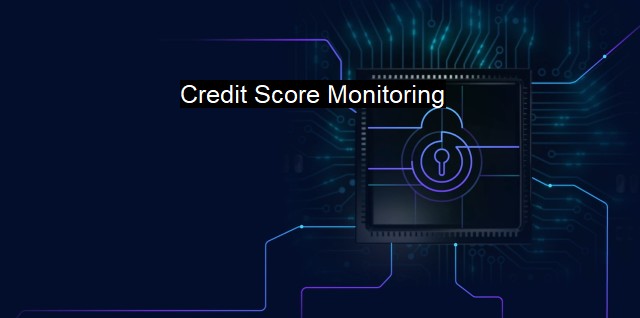What is Credit Score Monitoring?
The Power of Credit Score Monitoring: Keeping Your Identity and Finances Safe
Credit score monitoring is a crucial process that involves consistently tracking a person's credit history to detect any changes or suspicious activities. It is an essential part of cybersecurity practices, primarily when conducting financial transactions online. Traditionally, it has been a simple process of ensuring individuals are aware of their credit rating, knowing when that rating changes, and understanding the factors influencing these changes. In the modern digitized realm credit score monitoring has gained new layers of connotation, linking it intricately with cybersecurity and antivirus protection.From a cybersecurity perspective, credit score monitoring is a pivotal element in safeguarding a person's financial health and security. With increasing identity theft incidents, credit score monitoring ensures that your financial well-being doesn't plummet, and you remain up-to-date about your credit history. Meanwhile, the role of antivirus protection becomes apparent as it efficiently mitigates potential threats, thus averting unauthorized changes to your credit score.
When discussing credit score monitoring in reference to cybersecurity, it invariably brings the conversation towards identity or financial theft. Malicious hackers often try to manipulate or steal sensitive personal data and use it for various criminal activities, including adulterating your credit score. Consistent credit score monitoring can promptly detect such anomalies, enabling individuals to take swift action, thereby avoiding extensive damage.
Antivirus programs are kingpins of cybersecurity and play a paramount role in providing credit score monitoring support. They prevent malicious software such as Trojan horses, spyware, or worms from infiltrating and modifying the system's files and programs. Consequently, controlling how, when, and from what sources the information related to credit scores and other personal data is accessed.
Credit score monitoring needs to be performed on protected devices to reduce the risk of data leaks. Here, the antivirus software performs routine checks, alarms about suspicious behavior from files or programs, and also updates and patches identified security holes. Giving vigilant feedback about the state of system security helps ensure that credit score sister-systems are as sound as possible.
Advanced antivirus software goes beyond just safeguarding your device against viruses and malware; it further enhances the level of cybersecurity by offering additional layers of protection, such as anti-phishing and encryption software. These layers can significantly enhance credit score monitoring as they enable individuals to safely browse, communicate, and perform transactions online without worrying about data compromise.
The world is now starting to see the positive effects of integrating Artificial intelligence (AI) and Machine Learning (ML) in anticipation of cyber threats. Leveraging AI for credit score monitoring means algorithms scan for patterns and irregularities in your digital behavior which may have severe consequences for individuals' financial well-being. The benefit of using AI for credit score monitoring is the additional layer of protection against cyber threats, as AI has the ability to identify potential threats faster, therefore allowing you to shield your credit score from manipulation. Cybersecurity is no more about intrusion detection but prevention, wherein technologies like AI and ML can bring a proactive approach to stopping cyber-attacks.
Credit score monitoring is an essential practice to monitor financial well-being and safeguard against internet-related malpractices seamlessly. In today's digitized world, cybersecurity practices, especially antivirus software, enrich the reliability and efficiency of credit score monitoring. Therefore, the use of credit score monitoring and antivirus security measures together provides a powerful defense against data breaches, identity theft, and financial fraud. With technology progressively mutating, it is incumbent to stringently monitor credit scores for any suspicious changes and be proactive in taking necessary precautions for preserving financial health and privacy online.

Credit Score Monitoring FAQs
What is credit score monitoring?
Credit score monitoring is a service that tracks your credit score and alerts you to any changes or potential fraud or identity theft attempts. It helps you stay on top of your credit health and protects you from financial harm.Why is credit score monitoring important for cybersecurity?
Credit score monitoring is important for cybersecurity because it allows you to monitor your credit activity and detect any unauthorized access or attempts to use your personal information for fraudulent purposes. This helps you stay vigilant against potential cyber threats and protects your finances and identity.What are the benefits of using a credit score monitoring service?
The benefits of using a credit score monitoring service include early detection of potential identity theft or fraud, alerts for significant changes in your credit score, access to credit reports and scores, and personalized guidance on improving your credit health. It helps you stay informed and in control of your financial wellbeing.How do I choose a credit score monitoring service?
When choosing a credit score monitoring service, look for one that offers real-time alerts, daily monitoring, access to credit reports and scores from major credit bureaus, and personalized guidance on improving your credit health. Compare the features, pricing, and reputation of different providers to find one that meets your needs and budget.| | A | | | B | | | C | | | D | | | E | | | F | | | G | | | H | | | I | | | J | | | K | | | L | | | M | |
| | N | | | O | | | P | | | Q | | | R | | | S | | | T | | | U | | | V | | | W | | | X | | | Y | | | Z | |
| | 1 | | | 2 | | | 3 | | | 4 | | | 7 | | | 8 | | |||||||